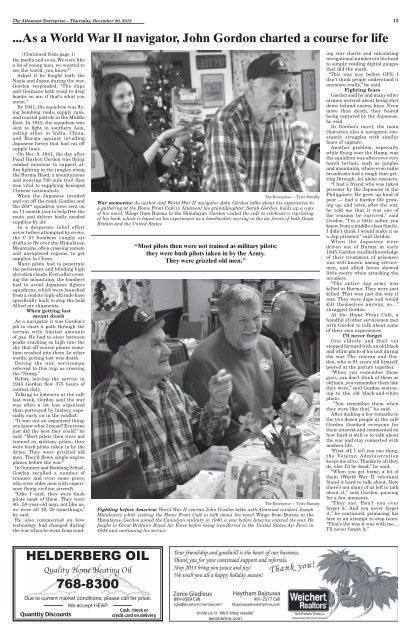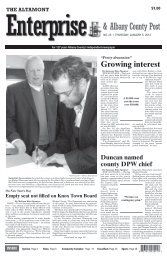& Albany County Post - The Altamont Enterprise
& Albany County Post - The Altamont Enterprise
& Albany County Post - The Altamont Enterprise
Create successful ePaper yourself
Turn your PDF publications into a flip-book with our unique Google optimized e-Paper software.
<strong>The</strong> <strong>Altamont</strong> <strong>Enterprise</strong> – Thursday, December 20, 2012 13<br />
...As a World War II navigator, John Gordon charted a course for life<br />
(Continued from page 1)<br />
the media and so on. We were like<br />
a lot of young men, we wanted to<br />
see the world, you know?”<br />
Asked if he fought both the<br />
Nazis and Japan during the war,<br />
Gordon responded, “<strong>The</strong> Japs<br />
and Germans both tried to drop<br />
bombs on me, if that’s what you<br />
mean.”<br />
By 1941, the squadron was flying<br />
bombing raids, supply runs,<br />
and coastal patrols in the Middle<br />
East. In 1942, the squadron was<br />
sent to fight in southern Asia,<br />
aiding allies in India, China,<br />
and Burma against invading<br />
Japanese forces that had cut off<br />
supply lines.<br />
On Dec. 8, 1941, the day after<br />
Pearl Harbor, Gordon was flying<br />
combat missions to support allies<br />
fighting in the jungles along<br />
the Burma Road, a mountainous<br />
and weaving 700 mile trail that<br />
was vital to supplying besieged<br />
Chinese nationalists.<br />
When the Japanese invaded<br />
and cut off the road, Gordon and<br />
the 203 rd squadron were sent on<br />
an 11-month tour to help free the<br />
route and deliver badly needed<br />
supplies by air.<br />
In a desperate relief effort<br />
never before attempted by crews,<br />
the C-47 bombers caught air<br />
drafts to fly over the Himalayan<br />
Mountains, often crossing remote<br />
and unexplored regions, to get<br />
supplies to China.<br />
Many pilots had to penetrate<br />
the persistent and blinding high<br />
elevation clouds. Even after crossing<br />
the mountains, the bombers<br />
had to avoid Japanese fighter<br />
squadrons, which were launched<br />
from a remote high-altitude base<br />
specifically built to stop the bold<br />
Allied air shipments.<br />
When getting lost<br />
meant death<br />
As a navigator it was Gordon’s<br />
job to chart a path through the<br />
terrain with limited amounts<br />
of gas. He had to steer between<br />
peaks reaching so high into the<br />
sky that off-course planes sometime<br />
crashed into them. In other<br />
words, getting lost was death.<br />
During the war, serviceman<br />
referred to this trip as crossing<br />
the “Hump.”<br />
Before leaving the service in<br />
1945 Gordon flew 375 hours of<br />
combat duty.<br />
Talking to listeners at the café<br />
last week, Gordon said the war<br />
was often a lot less organized<br />
than portrayed by history, especially<br />
early on in the conflict.<br />
“It was not an organized thing;<br />
you know what I mean? Everyone<br />
just did the best they could,” he<br />
said. “Most pilots then were not<br />
trained as military pilots; they<br />
were bush pilots taken in by the<br />
Army. <strong>The</strong>y were grizzled old<br />
men. <strong>The</strong>y’d flown single-engine<br />
planes before the war.”<br />
In Gunnery and Bombing School,<br />
Gordon recalled a number of<br />
trainers and even some peers,<br />
who were older men with experience<br />
flying civilian aircraft.<br />
“Like I said, they were bush<br />
pilots most of them. <strong>The</strong>y were<br />
40-, 50-year-old men, not like us,<br />
we were all 19, 20 somethings,”<br />
he said.<br />
He also commented on how<br />
technology had changed during<br />
the war when he went from read-<br />
<strong>The</strong> <strong>Enterprise</strong> — Tyler Murphy<br />
War memories: As author and World War II navigator John Gordon talks about his experiences to<br />
a gathering at the Home Front Café in <strong>Altamont</strong> his granddaughter, Sarah Gordon, holds up a copy<br />
of his novel, Wings from Burma to the Himalayas. Gordon visited the café to celebrate a reprinting<br />
of his book, which is based on his experiences as a bombardier, serving in the air forces of both Great<br />
Britain and the United States.<br />
“Most pilots then were not trained as military pilots;<br />
they were bush pilots taken in by the Army.<br />
<strong>The</strong>y were grizzled old men.”<br />
<strong>The</strong> <strong>Enterprise</strong> — Tyler Murphy<br />
Fighting before America: World War II veteran John Gordon talks with <strong>Altamont</strong> resident Joseph<br />
Matulewicz while visiting the Home Front Café to talk about his novel Wings from Burma to the<br />
Himalayas. Gordon joined the Canadian military in 1940, a year before America entered the war. He<br />
fought in Great Brittan’s Royal Air Force before being transferred to the United States Air Force in<br />
1944 and continuing his service.<br />
ing star charts and calculating<br />
navigational numbers in his head<br />
to simply reading digital gauges<br />
that did the math.<br />
“This was way before GPS. I<br />
don’t think people understand it<br />
anymore really,” he said.<br />
Fighting fears<br />
Gordon said he and many other<br />
airmen worried about being shot<br />
down behind enemy lines. Even<br />
more than death, they feared<br />
being captured by the Japanese,<br />
he said.<br />
In Gordon’s novel, the main<br />
character, also a navigator, constantly<br />
struggles with similar<br />
fears of capture.<br />
Another problem, especially<br />
while flying over the Hump, was<br />
the squadron was often over very<br />
harsh terrain, such as jungles<br />
and mountains, where even radio<br />
broadcasts had a tough time getting<br />
through, let alone rescuers.<br />
“I had a friend who was taken<br />
prisoner by the Japanese in the<br />
Philippines. He grew up kind of<br />
poor — had a harder life growing<br />
up, and later, after the war,<br />
he told me that it was one of<br />
the reasons he survived,” said<br />
Gordon. “I’m a little softer, you<br />
know, from a middle-class family;<br />
I didn’t think I would make it as<br />
a Jap prisoner,” said Gordon.<br />
When the Japanese were<br />
driven out of Burma in early<br />
1945, Gordon recalled knowledge<br />
of their treatment of prisoners<br />
was well known among servicemen,<br />
and allied forces showed<br />
little mercy when attacking the<br />
invaders.<br />
“<strong>The</strong> entire Jap army was<br />
killed in Burma. <strong>The</strong>y were just<br />
killed. That was just the way it<br />
was. <strong>The</strong>y were Japs and would<br />
kill themselves anyway, so…”<br />
shrugged Gordon.<br />
At the Home Front Café, a<br />
handful of other servicemen met<br />
with Gordon to talk about some<br />
of their own experiences.<br />
I’ll never forget<br />
One elderly and frail vet<br />
stepped forward with an old black<br />
and white photo of his unit during<br />
the war. <strong>The</strong> veteran and Gordon,<br />
who is 91 years old himself,<br />
peered at the picture together.<br />
“When you remember those<br />
guys, you don’t think of them as<br />
old men, you remember them like<br />
they were,” said Gordon motioning<br />
to the old black-and-white<br />
photo.<br />
“You remember them when<br />
they were like that,” he said.<br />
After making a few remarks to<br />
the two dozen people at the café<br />
Gordon thanked everyone for<br />
their interest and commented on<br />
how hard it still is to talk about<br />
the war and stay connected with<br />
modern life.<br />
“First off, I tell you one thing,<br />
the Veteran Administration<br />
keeps me alive. Thanks to all they<br />
do, else I’d be dead,” he said.<br />
“When you get home, a lot of<br />
them [World War II veterans]<br />
found it hard to talk about. Now<br />
there’s not many of us left to talk<br />
about it,” said Gordon, pausing<br />
for a few moments.<br />
“<strong>The</strong>y say, ‘Don’t you ever<br />
forget it.’ And you never forget<br />
it,” he continued, grimacing his<br />
face in an attempt to stop tears.<br />
“That’s the way it was with me…<br />
I’ll never forget it.”<br />
HELDERBERG OIL<br />
Quality Home Heating Oil<br />
768-8300<br />
Due to current market conditions, please call for price.<br />
We accept HEAP<br />
Cash, check or<br />
Quantity Discounts<br />
credit card on delivery

















